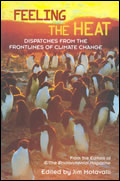Climate Climate & Energy
All Stories
-
The Meek Shall Inherit the Dearth
Climate change threatens to reverse progress on fighting poverty Global warming will disproportionately harm the world’s poorest people and “perpetuate injustices unprecedented in human history,” says Tony Juniper of Friends of the Earth. Such is the conclusion of a sobering report called “Up in Smoke,” released this week by a 17-member coalition of environmental and […]
-
Serge Dedina sends a dispatch from the fight against a Mexican LNG terminal
Serge Dedina is cofounder and executive director of WiLDCOAST, an international conservation team located in Imperial Beach, Calif., just north of the Mexico-U.S. border. He is the author of Saving the Gray Whale, a book based on the three years he lived in the gray-whale lagoons of Baja California. Friday, 15 Oct 2004 IMPERIAL BEACH, […]
-
Umbra on UV ratings
Dear Umbra, Our radio station provides daily information regarding ultraviolet ratings. I am curious about what these ratings actually represent, and why they change so dramatically. For example, for the past few years, most ratings have been between three and seven. Now we are getting ratings of 10. I doubt the ratings are directly related […]
-
Italy jumps on the SUV-bashing bandwagon
Europeans don't take as kindly to mobile global-warmers as do their American counterparts. Latest country to join in the anti-SUV backlash: Italy. The nation's Environment Ministry is plotting to slap a new tax on big gas-guzzlers, and possibly use the funds to incentivize people to scrap old cars and buy more efficient ones, Reuters reports.
-
Run-Run-Run-Run Runaway
Scientists puzzled by accelerating CO2 buildup in atmosphere A sharp acceleration in the rate of increase of carbon dioxide in the atmosphere has climate scientists puzzled and sounding a bit nervous. Mauna Loa Observatory, perched on a mountain in Hawaii, has been taking atmospheric CO2 measurements for almost 50 years. In recent decades, the rate […]
-
Climate change in the mainstream press
National Geographic last month became the latest national magazine to place climate change on its cover, publishing one of the strongest series of pieces on the topic yet to appear in a mainstream publication. You can view free excerpts here, but will have to pay a visit to your trusty library to read the whole issue. Be sure to check out the note from the magazine's editor in chief, Bill Allen, in which he explains why he felt compelled to run the stories even though he anticipates a lot of angry reaction to them. "Some readers will even terminate their memberships," Allen predicts.
Consider sending a letter to the editor commending the fella for his stiff spine. (The instructions say to include your name, address, and daytime phone.) Skeptic types like Patrick Michaels have been quick to lash back at Allen and the magazine.
When I first received notice of the 74-page series, I wondered whether National Geographic would lead with the term global warming or with climate change, the phrase now in vogue in many political and scientific circles. The magazine has it both ways. Allen goes with global climate change, but Tim Appenzeller, the publication's senior editor for science, and Dennis R. Dimick, its senior editor for environment and technology, begin their introduction to the series with the very words global warming. The magazine fronts the headline "Global Warning: Bulletins from a Warmer World" over a fiery picture of an Alaskan forest aflame.
-
Cheese-Eating Efficiency Monkeys
France has made big strides in energy efficiency After the global oil crises of the 1970s, both the U.S. and France took steps to increase energy efficiency and reduce their vulnerability to oil price fluctuations. Unlike the U.S., however, France stuck with them. Since 1973, U.S. oil use has risen by 16 percent, while France’s […]
-
Little Red Tibet
Tibet suffers melting glaciers and nuclear dumpage As if living under the heel of a repressive communist neighbor wasn’t bad enough, Tibet now has to contend with a coming ecological catastrophe and nuclear waste it didn’t produce. According to a survey conducted by some 20 U.S. and Chinese scientists, Tibet’s glaciers — which have been […]
-
Da!
Russian government approves Kyoto; treaty now likely to go into effect After years of mixed messages, coy feints, and internal drama, the Russian government at last approved the Kyoto Protocol today, virtually ensuring that the treaty will go into force worldwide by the end of the year. After the U.S. (responsible for 25 percent of […]
-
An excerpt from Feeling the Heat sizes up the ominous Asian Cloud
The Indian city of Mumbai, formerly Bombay, is home to one of Asia's largest slums and endures among the worst air quality on earth. Half the city's population lacks running water or electricity, and the smoke from countless wood-burning cooking fires joins with the acrid haze from two-stroke auto rickshaws, diesel buses, and coal-fired power plants to all but choke the city. Breathing Mumbai's air, reports the Lonely Planet travel guide, is equivalent to smoking 20 cigarettes a day. Comparable air quality wraps New Delhi, Bangalore, and 69 of India's 70 principal cities year-round, according to a 1997 study by India's Central Pollution Control Board.
